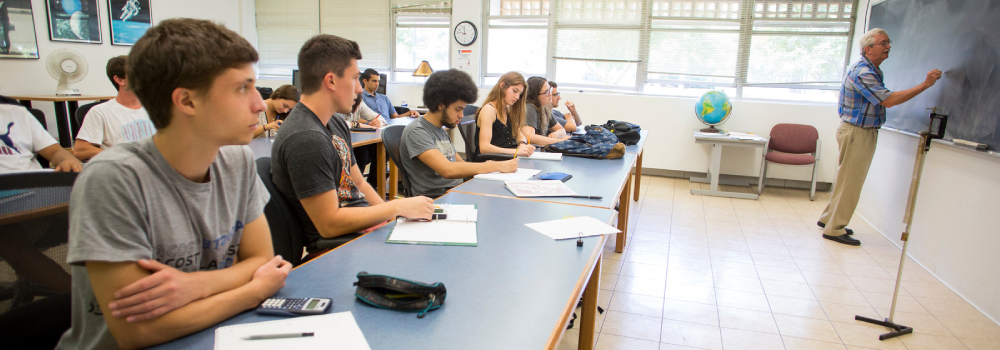
A major in physics can lead not only to a possible career in research, but also law, medicine and many other diverse careers. The department has many courses that satisfy the University's core requirements. In addition to majoring and minoring in physics, students may want to consider majoring in applied physics. This program allows a student to combine the benefits of a strong physics foundation with the applied knowledge of other majors.
-
The B.S. in Applied Physics is an interdisciplinary program that integrates the core physics
curriculum with those of other majors. Starting Fall 2025, students will be able to choose from one
of the following concentrations: Electrical Engineering, Mechanical Engineering, Computer Science, Chemistry, and Statistics and Data Science. In consultation with their advisor, students will can make the choice that matches their career aspirations. By combining different perspectives, tools and ideas, Applied Physics majors will be prepared to address some of today’s and tomorrow’s most challenging problems. In addition to regular coursework, all Applied Physics majors must complete a senior thesis project as a graduation requirement. This hands-on research experience with faculty from Physics and other disciplines exposes students to the type of work encountered in graduate school and industry, and enhances their undergraduate portfolio. Upon graduation, students are prepared to be successful in traditional physics careers as well as in new and emerging fields.View the curriculum requirements.
-
The B.S. in Physics provides a solid foundation in classical, quantum, and relativistic physics. By choosing appropriate physics electives in consultation with their faculty advisor, the student can study astrophysics, condensed matter systems, cosmology, particle physics, and space physics. In addition to regular coursework, all Physics majors must complete a senior thesis project as a graduation requirement. This hands-on research experience with Physics faculty exposes students to the type of work encountered in graduate school and industry, and enhances their undergraduate portfolio. Upon graduation, Physics students can pursue advanced studies in a variety of physics-related disciplines, as well as in fields such as medicine, business management, and law, where a physics major can utilize their problem-solving and critical thinking skills.
View the curriculum requirements.
-
Minor Requirements
20 semester hours with at least 8 semester hours in upper division courses. These shall include:
either:
- PHYS 1100 Introduction to Mechanics 4 semester hours
- PHYS 2100 Introduction to Electricity and Magnetism 4 semester hours
- PHYS 2600 Foundations of Modern Physics 4 semester hours
or:
- PHYS 2500 General Physics I 4 semester hours
- PHYS 2550 General Physics II 4 semester hours
- PHYS 2600 Foundations of Modern Physics 4 semester hours
Notes:
- A grade of C (2.0) is required for every course included in the minor.
- PHYS 3740 Weapons of Mass Destruction cannot be taken for credit towards a physics minor.
-
Physics (PHYS)
- PHYS 301 Electromagnetic Fields
- PHYS 371 Biophysics
- PHYS 411 Modern Physics Lab
- PHYS 471 Introduction to Relativity/Cosmology
- PHYS 480 Capstone Experience
- PHYS 490 Physics Teaching
- PHYS 493 Physics/Applied Physics Internship
- PHYS 498 Special Studies
- PHYS 499 Independent Studies
- PHYS 1000 Thinking in Science
- PHYS 1100 Introduction to Mechanics
- PHYS 1200 Computational Lab
- PHYS 1600 Waves, Optics, and Thermodynamics
- PHYS 1998 Special Studies
- PHYS 1999 Independent Studies
- PHYS 2100 Introduction to Electricity and Magnetism
- PHYS 2200 Intermediate Mechanics
- PHYS 2500 General Physics I
- PHYS 2550 General Physics II
- PHYS 2600 Foundations of Modern Physics
- PHYS 2710 Astronomy
- PHYS 2780 Great Ideas in Physics
- PHYS 2998 Special Studies
- PHYS 2999 Independent Studies
- PHYS 3100 Electrodynamics
- PHYS 3200 Quantum Mechanics
- PHYS 3300 Thermodynamics and Statistical Mechanics
- PHYS 3400 Advanced Laboratory
- PHYS 3740 Weapons of Mass Destruction
- PHYS 3800 Junior Project
- PHYS 3998 Special Studies
- PHYS 3999 Independent Studies
- PHYS 4100 Space Physics
- PHYS 4150 Condensed Matter Physics
- PHYS 4200 Astrophysics
- PHYS 4250 Modern Optics
- PHYS 4300 Biophysics
- PHYS 4350 Elementary Particle Physics
- PHYS 4400 Introduction to Relativity and Cosmology
- PHYS 4800 Capstone Experience
- PHYS 4810 Senior Thesis
-
Physics majors will be able to:
- Comprehend the concepts and theories of classical and modern physics, as well as the discoveries and inquiries of contemporary physics.
- Solve problems using the relevant mathematical methods.
- Design and conduct experiments, as well as analyze and interpret the resulting data.
- Form new inferences about the physical world by carrying out scientific investigations.
- Communicate effectively core physical principles, experimental results, and analysis of physical problems.
- Demonstrate ethical and unbiased behaviors while engaging in scientific endeavors.